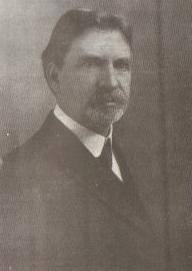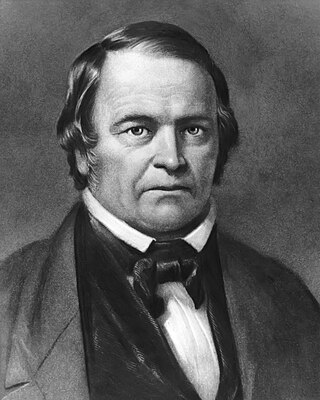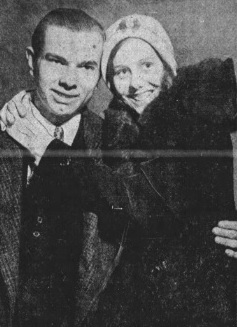William Pascoe Goard F.R.G.S (17 January 1863 - 9 February 1937) was a Methodist minister and prominent British Israelite of the first half of the 20th century.
Contents

William Pascoe Goard F.R.G.S (17 January 1863 - 9 February 1937) was a Methodist minister and prominent British Israelite of the first half of the 20th century.

William Pascoe Goard was born in Cornwall, England. After studying law in London, he moved to Bowmanville, Ontario in 1880. [1]
Goard was a member of The Salvation Army, where he rose to the rank of captain in charge of the corps at St. Catharines, Ontario. In 1883, he married Amanda Content Honey, who was also an officer in The Salvation Army. He moved to Winnipeg and was ordained as a Methodist minister in 1886.
In 1906, Goard moved to Vancouver to serve as minister of Zion church, [1] and in 1912 became minister of the Knox Congregational Church (later renamed Grandview Congregational Church). [2]
Goard organized the British Israel Association of Vancouver in 1909 along with Edward Odium, [1] [3] : 14 and in 1913 he traveled to London to participate in negotiations uniting various British Israel groups into the British-Israel-World Federation. He became vice president of the BIWF in 1921. He was the first editor of The National Message published by the BIWF when it was founded in 1922, also founded Covenant Publishing, the publishing arm of the BIWF. [1] Later he became the President of the World Council of the BIWF.[ citation needed ]
Goard was a prolific author, writing more than 20 books on British Israelism, as well as publishing articles and editorials for The National Message. In 1930, he attended a special ceremony at the Chicago–Kent College of Law where he was awarded the degree of "Doctor of Legislative Law" in recognition of excellent scholarship for his book The Law of the Lord: The Common Law (1928). [1]
On 17 September 1936 Goard was welcomed by the BIWF at Spencer Street Station, Melbourne, Australia. He made a tour of both New Zealand and Australia in autumn 1936 before his death at Harrow Weald College, England, on 9 February 1937, at the age of 74. [1]
The Two-fold British Race in Britain and Palestine (1921)
Isaiah: a study (1925)
Our Heritage: the Bible (1926)
The Bible and Science (1926)
The Epistle to the Romans (1927)
The Law of the Lord: The Common Law (1928)
The kingdom of God (1928)
Crossing the river (1930)
The Documents of Daniel (1930)
The Empire In Solution With Chapters On Anglo-Saxon Civilization (1931)
The simple truth (1932)
The second coming of our Lord (1932)
Bethesda-or-Jesus Christ (1933)
The Post-Captivity Names of Israel (1934)
What is British-Israel truth? (1936)

Methodism, also called the Methodist movement, is a group of historically related denominations of Protestant Christianity whose origins, doctrine and practice derive from the life and teachings of John Wesley. George Whitefield and John's brother Charles Wesley were also significant early leaders in the movement. They were named Methodists for "the methodical way in which they carried out their Christian faith". Methodism originated as a revival movement in the Church of England in the 18th century and became a separate denomination after Wesley's death. The movement spread throughout the British Empire, the United States, and beyond because of vigorous missionary work, and today has about 80 million adherents worldwide.

British Israelism is the British nationalist, pseudoarchaeological, pseudohistorical and pseudoreligious belief that the people of Great Britain are "genetically, racially, and linguistically the direct descendants" of the Ten Lost Tribes of ancient Israel. With roots in the 16th century, British Israelism was inspired by several 19th century English writings such as John Wilson's 1840 Our Israelitish Origin. From the 1870s onward, numerous independent British Israelite organizations were set up throughout the British Empire as well as in the United States; as of the early 21st century, a number of these organizations are still active. In the United States, the idea gave rise to the Christian Identity movement.

Dispensationalism is a theological system of interpreting the Bible that was first espoused by John Nelson Darby. Dispensationalism maintains that history is divided into multiple ages or "dispensations" in which God acts with humanity in different ways. Dispensationalists generally maintain beliefs in premillennialism, a future restoration of Israel, and a rapture that will happen before the second coming, generally seen as happening before the tribulation. The term "dispensationalism" itself was coined by a critic of the system, Philip Mauro, in 1926.

Congregational churches are Protestant churches in the Calvinist tradition practicing congregationalist church governance, in which each congregation independently and autonomously runs its own affairs.

The Churches of God (Seventh-Day) is composed of a number of sabbath-keeping churches, among which the General Conference of the Church of God, or simply CoG7, is the best-known organization. The Churches of God observe Sabbath on Saturday, the seventh day of the week.
The Wesleyan Church, also known as the Wesleyan Methodist Church and Wesleyan Holiness Church depending on the region, is a Methodist Christian denomination in the United States, Canada, the United Kingdom, South Africa, Namibia, Sierra Leone, Liberia, Indonesia, and Australia. The church is aligned with the Wesleyan-Holiness movement and has roots in the teachings of John Wesley. It adheres to Wesleyan-Arminian doctrine and is a member of the World Methodist Council.

Covenant theology is a conceptual overview and interpretive framework for understanding the overall structure of the Bible. It uses the theological concept of a covenant as an organizing principle for Christian theology. The standard form of covenant theology views the history of God's dealings with mankind, from Creation to Fall to Redemption to Consummation, under the framework of three overarching theological covenants: those of redemption, of works, and of grace.

The New Covenant is a biblical interpretation which was originally derived from a phrase which is contained in the Book of Jeremiah, in the Hebrew Bible.

The Pentecostal Assemblies of Canada (PAOC) is a Pentecostal Christian denomination and the largest evangelical church in Canada. It reports 239,267 adherents and 1,076 member congregations throughout Canada. Its headquarters is located in Mississauga, Ontario.
The British-Israel-World Federation is a United Kingdom-based organization that promotes British Israelism, a pseudohistorical belief that the people of the British Isles are direct descendants of the Ten Lost Tribes of ancient Israel. The group was founded in London on 3 July 1919, although its roots can be traced back to the 19th century.

The Presbyterian Church in Canada is a Presbyterian denomination, serving in Canada under this name since 1875. The United Church of Canada claimed the right to the name from 1925 to 1939. According to the Canada 2001 Census 409,830 Canadians identify themselves as Presbyterian, that is, 1.4 percent of the population.
William George Martin was a Canadian clergyman and politician. Martin represented Brantford in the Legislative Assembly of Ontario from 1926 to 1934 as a Conservative member and St. Matthews as a Progressive Conservative member of the Legislative Assembly of Manitoba from 1958 to 1966.
The Methodist Church of Great Britain is a Protestant Christian denomination in Britain, and the mother church to Methodists worldwide. It participates in the World Methodist Council, and the World Council of Churches among other ecumenical associations.

Albert Edward Smith, known as A. E. Smith, was a Canadian religious leader and politician. A social gospeller, Smith was for many years a minister in the Canadian Methodist Church before starting his own "People's Church". He served in the Legislative Assembly of Manitoba from 1920 to 1922 as a Labour representative. In 1925, he became a member of the Communist Party of Canada.

Eucharistic theology is a branch of Christian theology which treats doctrines concerning the Holy Eucharist, also commonly known as the Lord's Supper. It exists exclusively in Christianity and related religions, as others generally do not contain a Eucharistic ceremony.

Wesley A. Swift was a minister from Southern California who was known for his white supremacist views and was the central figure in Christian Identity from the 1940s until his death in 1970.

Samuel Parkes Cadman was an English-born American liberal Protestant clergyman, newspaper writer, and pioneer Christian radio broadcaster of the 1920s and 1930s. He was an early advocate of ecumenism and an outspoken opponent of anti-Semitism and racial intolerance. By the time of his death in 1936, he was called "the foremost minister of Congregational faith" by the New York Times.

Wesleyan theology, otherwise known as Wesleyan–Arminian theology, or Methodist theology, is a theological tradition in Protestant Christianity based upon the ministry of the 18th-century evangelical reformer brothers John Wesley and Charles Wesley. More broadly it refers to the theological system inferred from the various sermons, theological treatises, letters, journals, diaries, hymns, and other spiritual writings of the Wesleys and their contemporary coadjutors such as John William Fletcher.
Howard Rand, also known as Howard B. Rand and Howard Benjamin Rand was a lawyer, inventor, and three-time candidate for Massachusetts state office on the Prohibition Party ticket, He headed the former Anglo-Saxon Federation of America, a British Israelist group. He served from 1937 to 1968 as editor of its affiliate Destiny Publishers, which put out Destiny magazine.

Congregationalism in the United States consists of Protestant churches in the Reformed tradition that have a congregational form of church government and trace their origins mainly to Puritan settlers of colonial New England. Congregational churches in other parts of the world are often related to these in the United States due to American missionary activities.